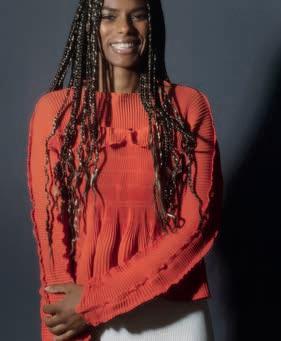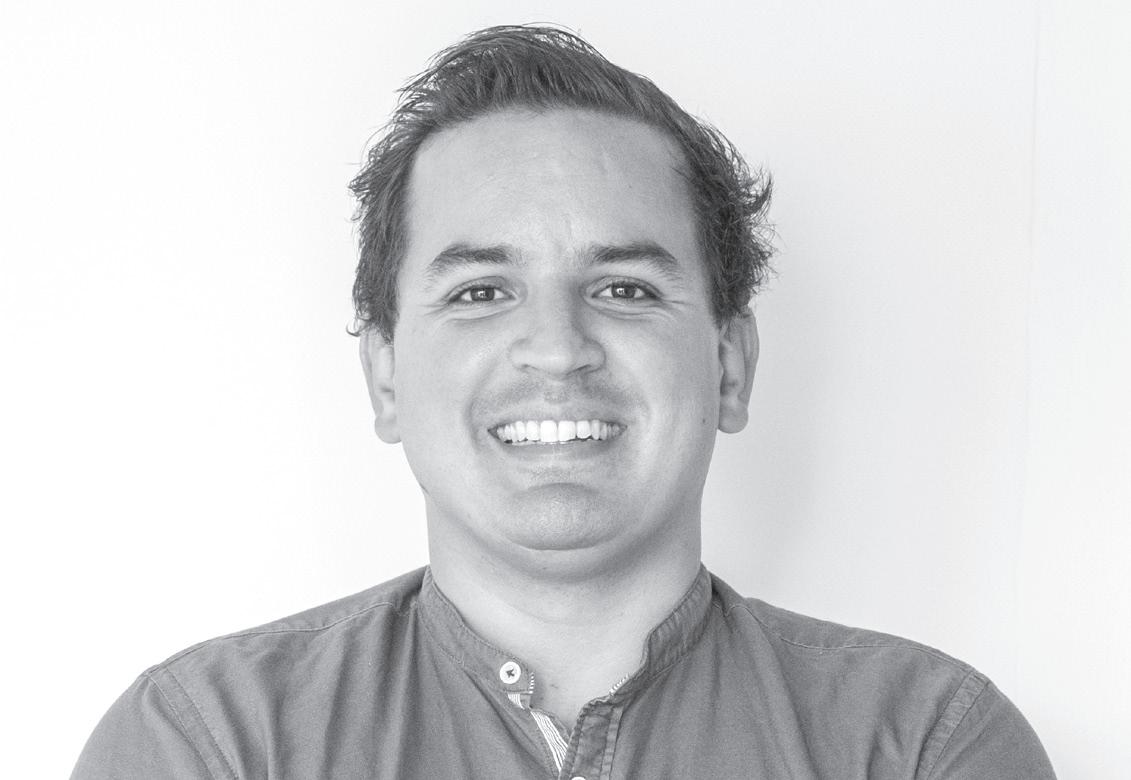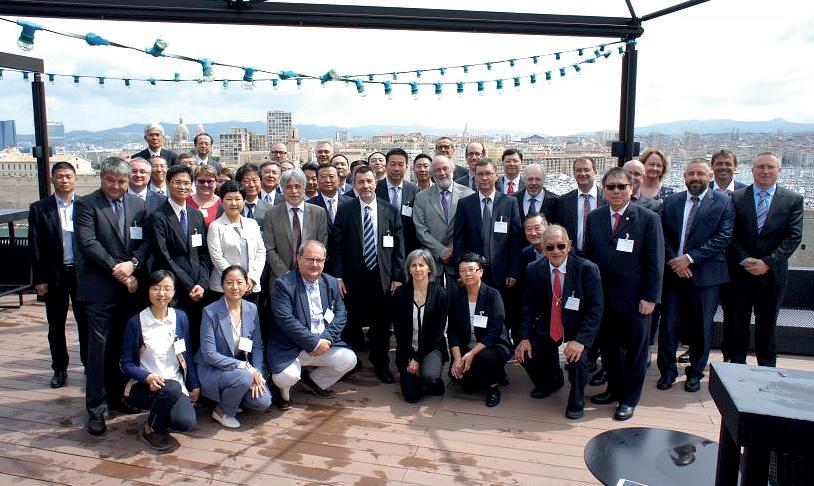
10 minute read
The Possibilists
Careers
Pioneers, explorers, the new«possibilists»

Sublissima Noëlla, the impact maker I met at Baselworld
She was on the launch podium for ethical gold according to Chopard in 2018 at Baselworld. Cypriot-Congolese top model Noëlla Coursaris Munsuka is the founding soul of Malaika Foundation - angel in Swahili. This fashion photographer’s muse dedicates her fame to the education of young girls in Congo. She is the embodiment of international figureheads who are committed. Her resolute and gentle voice is an awareness of one of the most chilling contemporary realities: as a gold producer, her country is full of children who survive in poverty and destitution. His moving message became even more concrete. For beyond this gold that not everyone can afford, there is also cobalt, which can be found in any cell phone and of which his native Congo is overflowing. And if finally, thanks in particular to Chopard’s connections with the world’s red carpets, the ultimate luxury in watchmaking or jewelry could be achieved through greater respect for materials. _JAG - https://malaika.org
All of them embody an inspiring human journey. Visionary boss, missionary industrialist, enlightened start-upper or manufacturing technician, professional in recycling, sorting and harvesting waste, Manufacture director, young founder of a new brand or initiator of a solar furnace... Their public exposure shapes tomorrow’s potentials, including training and specific expertise. Some good examples, careers in the making…
By the editorial team of JSH® Magazine

A souvenir: Mike Horn, Panerai’s ambassador and adventurer of the extreme, crossed paths with him during a stopover in Monaco while he was sailing around the world for four years to raise environmental awareness among young people. While the famous explorer continues his quest, the Richemont Group brand is also pursuing the sustainable watchmaking path by launching its Submersible eLAB-ID concept watch, made from 98.6% recycled materials.

Sustainability Skills for the future
By HM Khedoud - Ollivier Broto / TàG Press +41 - JAG
Announcements come and go. While greenwashing is having a field day, and the environmental guarantee is on everyone’s lips, certain human paths are leading the way.
Some people use the concept of sustainable development to promote themselves. Others preach through their actions and set an example.
Meeting with a recycler
When Raphaël Broye de Panatere drew up his roadmap for the installation of a solar furnace in the Jura, when he became involved in the production of recycled steel, he found a major ally in Reconvilier. «His project meets environmental expectations. It provides new ecological solutions to enhance the value of the products to be recycled,» explains Precycling director Gilles Fischer, who has been a recognised player in recycling for several years. «We validate the products supplied to the foundry by setting up the logistics to recover the scrap. We analyse the quality and prepare homogeneous batches in order to facilitate reworking and guarantee the finished product.

Is the awareness of private individuals and companies evolving, and what about the laws? «Reports such as those of Swiss Recycling show the evolution of recycled materials in percentages. The guidelines have been in existence since 1986 and deal with the basic principles and objectives applicable to waste in Switzerland. Our job is to meet these requirements. We are regularly audited by the Office des Eaux et des Déchets to validate our operating permit. Success depends above all on the means given to people and companies who care about the environment.


Sorting, recovery, transport, all this costs and pollutes? «The costs potentially linked to the methodology of sorting products at the origin of production are very low. The costs of control and sorting depend on the origin and the discipline. Recycling is a product resource for the industry. It is our duty to limit the nuisance and Precycling uses its resources and knowledge to reduce the environmental impact. Our recycling is the implementation of eco-cyclical projects that preserve natural resources.»
ID Genève, more than just a watch, an ecosystem
This Geneva-based watch brand is playing at being a start-up. «It’s an identity that goes beyond the product and responds to all the circular considerations,» says Nicolas Freudiger, co-founder of what should be considered the very first laboratory for a circular brand. In fact, the first collec-


tion is called Circular 1 and it «meets the requirements of the circular economy, with recycled and recyclable materials as well as coherent production circuits», explains the man who, like his associates, worked in the watchmaking industry and dreamed of a «positive change» that is much more than a generational sensitivity. «The generational barrier, if it exists, will be completely erased because it is more a question of economic and political interests. If ID Geneva can serve as a circular ‘model’, it will be a great victory.» And there is no question of skimping on quality: «There is often a trade-off between quality and recycled materials, we make no compromises in terms of quality, all materials are tested according to the standards of the watch industry.» n
www.panerai.com www.precyclingsa.ch www.IDwatch.ch
Jérôme Cavadini, Operational Director Manufacture Panerai

The brand, known for its links with the underwater world, is forging strong ties with its aficionados and taking them to sublime and mysterious territories to explore. In addition to its visuals, which evoke the great escape to the vast natural expanses of adventure, the preservation of the seabed and virgin exploration, Officine Panerai is making its mark on the watch industry with the launch of its Luminor Marina eSteel, and its concept timepiece, the Subsmersible eLAB-ID. «With 98.6% of its weight in recycled materials, this watch is a model of sustainable watchmaking» boasts the press release.
Why on earth did they choose to base it on weight? «Calculating this percentage by value and not by weight would have no connection with the environment. Weight was the most objective, because you can weigh everything and determine a recycling rate,» explains the man who has spent more than 25 years in the watchmaking industry. «In terms of recycling, we aim for the maximum number of elements, luminova, glass, etc. For sapphire glass alone, it took us 6-8 months of research: ice, purity of the cores (editor’s note: long silica bar). Jérôme Cavadini is convincing when he details, for the watch crystal alone, all the recycling processes that had to be mastered. From the initial scraps of material, the reworking and shaping to be able to make watch glasses: «breaking our teeth on the impurities, finding properties similar to the raw material, mastering the cutting...».
Assuming that everything has been weighed, including the strap, the buckle, the crystal and the hands, it seems obvious that the initial roadmap, and therefore the wishes of the ebullient CEO Jean-Marc Pontroué, should aim for 100%? «Obviously, a boss has optimal expectations! In theory we could achieve this. But that would involve crazy energy consumption and waste of resources, which would make the objective meaningless and damage the very nature of the project. The coherence argument was therefore favoured. Like the choice of EcoTitanium, a clean metal made from titanium scraps from the aerospace industry and the recovery of its scraps... Like the very trendy posture, finally (!), which consists of playing the game of total transparency and exposing the virtuous circle of all the suppliers - the co-contractors, as I have renamed them - who participated in the adventure.
An update from its president, Jean-Daniel Pasche
Interview by Joël A. Grandjean, Editor-in-Chief
As the term industrial begins to flourish with common names related to recycling, environmental ethics and carbon footprint measurement, the question of standardisation or regulation arises...
Not everyone can write the word waterproof on a watch face or in an instruction manual. The thing is regulated and, since the safety and the life of the diver can depend on the waterproofness, any affixing of the kind must be measurable and tested. Will the same thing happen one day, perhaps simply because consumers demand it, with the terms “recyclable, recycled “and all sorts of vocabulary linked to these new data? Beyond international legislation, ISO and other accepted standards, there are the standards of the Swiss watch industry.

Is the FHS considering standards relating to the concept of recycling?
The creation or revision of watchmaking standards is the responsibility of the Swiss Watch Industry Standards Committee, one of the FH commissions (Swiss NIHS standards and international ISO standards). At present, there are no watchmaking standardisation projects at this stage. It must be said that national legislation is emerging on this subject (environment, recycling, waste disposal, sustainability) almost everywhere, particularly in France. Our priority is to inform companies about this legislation and help them prepare for it. It is difficult to standardise on a private level when standards do not have the force of law.
Is there any such reflection at European level (ISO standards for example, or other)?
There is a committee dealing with this subject (ISO/TC 323) under the aegis of France but it concerns the whole economy and does not specifically concern watchmaking. We are not aware of any results at this stage. In the same way that the word «watertight» belongs to the domain of legislation, will there one day be directives for the use of all these words that are increasingly widespread without control (eco-responsibility, recyclable, etc.)? There are already regulations, particularly
Watchmaking standards
The head of the NIHS department (Swiss watch industry standard) is Patrick Lötscher. Raphaël Schwarz is in charge of technical regulatory affairs in the FH legal department (REACH, RoHS, substances, materials, batteries... Download the standards: https:// www.fhs.swiss/fre/standards.html Appointed President of the Swiss Watchmaking Federation in 2002, he had already been its Director since 1993. Re-elected in June 2021 for a final term of office, JeanDaniel Pasche will continue to support the industry’s challenges.
Participants in Marseille in 2019 at the ISO TC 114 congress (watchmaking), whose president is Swiss: Silvano Freti, 2nd row-1st row standing, 4th from the left (white hair, light jacket). In 2021, this congress was held by videoconference.
Every gold alloy has its own colour! The FHS therefore has a standard reference box for checking and guaranteeing the manufacturers’ specifications. in the EU, France and the USA, concerning terms related to ecology, either precise definitions of words, or directives concerning the use of certain words (restriction of use, coefficients, percentages, etc.). It is certain that this legislative evolution will continue in order to avoid abuse and confusion. However, this type of regulation goes beyond watchmaking, as it concerns all industrial sectors.
At the level of the markets, do the brands tell you that they have particular expectations regarding these new parameters?
We feel that watchmaking companies are increasingly interested in these concerns, which are often questioned by their customers or by consumers. They are expressing expectations that need to be met. The pandemic has accentuated these phenomena.
What would you say about a solar oven in the Jura? Is it a utopia?
Without wishing to prejudge the technical feasibility, it is not a utopia in principle insofar as such a project would be part of the search for sustainability and local supply, two notions that are becoming increasingly important with the energy challenges. n


https://www.fhs.swiss/



